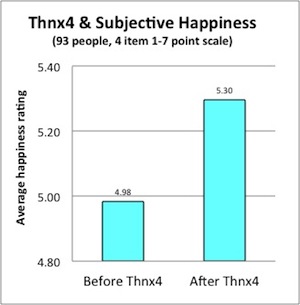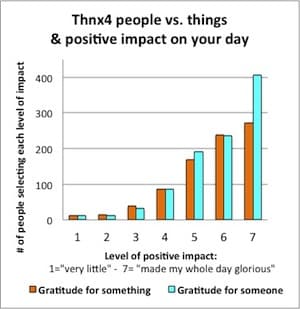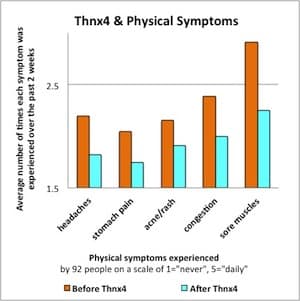10 Reasons to Practice an Attitude of Gratitude (Besides, It’s Good for You!)
By: E. Demond Scott, MD
With the holiday season quickly approaching, it’s the time of year when we’re more likely to express our thankfulness. We give thanks for family, for friends and for health. We’re thankful for what we have and do our best to show gratitude. But what exactly is gratitude? The root meaning of gratitude translates to grace, graciousness or gratefulness. This means that gratitude is appreciation for what can be seen, like people and objects, and what cannot be seen, like feelings and knowledge. Gratitude helps people realize the good things in their lives. They also realize that the source of their gratitude and happiness is usually caused by something or someone other than themselves. This cause of happiness can come from many sources like people, objects or even faith.
Through research, gratitude has been shown to be linked to greater happiness. It increases positive emotions, strengthens relationships, improves physical health and aids in the development of problem-solving skills (Harvard Health Publishing). Expressing gratitude can be done in many ways like appreciating what you have and people from the past, celebrating good things as they present themselves and having a positive outlook for the future and what it can offer. No matter the amount of gratitude a person has, it can be a tool to further improve their health.
Research
Research done by Dr. Robert A. Emmons of the University of California, Davis, and Dr. Michael E. McCullough of the University of Miami, suggests that gratitude is connected to a healthier life. In their experiment, people in three groups each wrote a few sentences every week to describe how their week went. One group was told to write about what they were grateful for every week. Another group was told to write about what had upset them during the week. The final group wrote about how events of the week made them feel without it necessarily being negative or positive. The results of the ten-week experiment showed that the group who had written down what they were grateful for every week were overall, more optimistic, exercised more often and had fewer visits to the doctor (Harvard Health Publishing).
Another study by the Greater Good Science Center, agrees with Emmons and McCullough’s research. They launched Thnx4.org, an online gratitude journal that asks participants to say what they are grateful for and how long they have felt grateful. Additionally, they also described their emotional state for the day. As part of the experiment the participants completed surveys before and after the two-week experiment. This survey focused on the impact of the online journal on the participants’ happiness, emotional resilience and satisfaction with life (Simon-Thomas, 2012). This experiment found that the more gratitude a participant recorded in a day, the more positive emotions they would experience. The charts below show the results of the surveys in participants that recorded gratitude entries every day for two weeks.

Thnx4.org is an online gratitude journal that asks participants to say what they are grateful for.

This experiment found that the more gratitude a participant recorded in a day, the more positive emotions they would experience.

Other results of the Thnx4.org experiment proved that participants handled stress better after the two-week period.
Other results of the Thnx4.org experiment proved that participants handled stress better after the two-week period. Additionally, participants reported fewer headaches, less congestion, fewer stomach aches, less coughing and fewer sore throats.

Participants reported fewer headaches, less congestion, fewer stomach aches, less coughing and fewer sore throats.
Both experiments show that realizing and expressing gratitude may lead to improved mental and physical health (Simon-Thomas, 2012).
More Facts About Gratitude and Physical Health (How to be Happy, 2019).
Cancer begins when cells that the body doesn’t need are formed or when the body doesn’t remove old or damaged cells (The Breast Health Guide). The extra cells usually form a lump, growth or tumor. A tumor can be “malignant”, which means they are cancerous, or “benign”, which means non-cancerous.
- Gratitude makes us happier
Writing in a gratitude journal for five minutes a day can increase long-term well-being by more than 10 percent (How to be Happy, 2019). It’s proven that gratitude makes us feel more gratitude. The amount of gratitude that develops in those five minutes is small, but the emotions felt during that time are enough to create a grateful mood.
- Gratitude makes us healthier
It has been proven that those that practice gratitude have fewer physical symptoms of illness and less pain overall. Also, it increases the amount of sleep a person gets in a night. Among other benefits are decreases in overall moods of anxiety, depression and blood pressure.
- Gratitude strengthens our emotions
Gratitude often helps us create happier memories and allows us to experience good feelings. This also strengthens our ability to cope with stress and other strong emotions.
- Gratitude develops our personalities
Gratitude plays an important role on your personality; it can increase optimism, spirituality and self-esteem. It also makes people less self-centered and less materialistic.
- Gratitude makes us more optimistic
As stated before, gratitude increase optimism. This is proven by studies that have people write down their gratitude weekly. This led to a direct relationship between the two. For example, in one study, writing in a gratitude journal daily increased optimism by 15%.
- Gratitude increases self-esteem
Practicing gratitude increases self-esteem. This is because a person who recognizes the kindness from others tends to receive more help and more recognition. If a person shows gratitude for the help or support they receive, those who help tend to want to help or support again.
- Gratitude improves sleep
Thoughts of worry or anxiety often keep people up at night. When a person expresses gratitude, this helps ease those worries and anxieties. This allows the body and mind to relax. With that relaxation, it will help a person fall asleep quicker and have better quality of sleep.
- Gratitude increases energy levels
Energy levels are directly connected to exercise, optimism and mental well-being. All these traits are strengthened with a grateful mind.
- Gratitude helps us relax
Overall, positive emotions help relax the mind and body. Expressing and acknowledging gratitude will help promote positive emotions.
- Gratitude deepens relationships
Gratitude can help your marriage, help you make friends and help you network. When people are able to show gratitude and understanding towards their friends, family and acquaintances, it makes others feel good. This behavior makes others want to return your kindness.
Practicing Gratitude
Practicing gratitude can be done even after the holidays have passed. It’s important to take time for mental and physical health. Exercising gratitude benefits you and the people around you. Some ideas on how to practice gratitude are (Oppland, 2019):
Starting a gratitude journal. Once a week write down the positive things that have happened, what you are grateful for or people you are grateful for. Also record your feelings (including stress) to track the changes in your life.
Expressing your gratitude to others. Once a month let someone know why you are thankful for them and how they have changed your life.
Making a gratitude jar. Set a decorated jar somewhere you will see it a couple times a day. It can remind you of what you are thankful for. Each time you feel gratitude, put some money in the jar. Once it is full, donate the money to help others.
Meditating. Meditation makes you stop for a minute to enjoy, relax and appreciate the present moment. Guided meditations are available to help you through the thoughts of meditation.
Writing gratitude prompts. Write about what you are grateful for using prompts. This can be done, once a week, once a month or whenever you feel. A few example prompts are below (Marelisa, 2018). You can also find more here: https://daringtolivefully.com/gratitude-prompts
I’m grateful for three things I hear:
I’m grateful for three things I see:
I’m grateful for three things I smell:
I’m grateful for three things I touch/feel:
While the holiday season lasts for a short time, keeping these tips on gratitude in mind throughout the year can leave a lasting impact on your mental and physical health. Challenge yourself to start a gratitude journal and write in it for five minutes a day and see if you start to notice a difference over time. An attitude of gratitude goes a long way!
References
Harvard Health Publishing. (n.d.). Giving thanks can make you happier. Retrieved October 23, 2019, from https://www.health.harvard.edu/healthbeat/giving-thanks-can-make-you-happier.
Simon-Thomas, E. R. (2012, December 19). A “Thnx” a Day Keeps the Doctor Away. Retrieved October 23, 2019, from https://greatergood.berkeley.edu/article/item/a_thnx_a_day_keeps_the_doctor_away.
How to be Happy. (2019, August 19). Retrieved October 23, 2019, from https://www.happierhuman.com/benefits-of-gratitude/.
Oppland, M. (2019, April 7). 13 Most Popular Gratitude Exercises & Activities [2019 Update]. Retrieved October 23, 2019, from https://positivepsychology.com/gratitude-exercises/.
Marelisa. (2018, November 17). Gratitude Prompts – 100 Things to Give Thanks For. Retrieved October 23, 2019, from https://daringtolivefully.com/gratitude-prompts.


